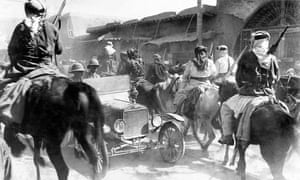NOVANEWS
By GPD
The agreements that shaped the region may be forgotten in the west, but in the Middle East their significance still looms large

… by Ian Black, Middle East editor
It was just a joke. These first world war agreements cooked up in London and Paris in the dying days of the Ottoman empire paved the way for new Arab nation states, the creation of Israel and the continuing plight of the Palestinians. And if their memory has faded in the west as their centenaries approach, they are still widely blamed for the problems of the region at an unusually violent and troubled time.
“This is history that the Arab peoples will never forget because they see it as directly relevant to problems they face today,” argues Oxford University’s Eugene Rogan, author of several influential works on modern Middle Eastern history.
In 2014, when Islamic State fighters broke through the desert border between Iraq and Syria – flying black flags on their captured US-made Humvees – and announced the creation of a transnational caliphate, they triumphantly pronounced the death of Sykes-Picot. That gave a half-forgotten and much-misrepresented colonial-era deal a starring role in their propaganda war – and a new lease of life on Twitter.
It also famously contradicted earlier promises made by the British to Sharif Hussein of Mecca before he launched what TE Lawrence called the “revolt in the desert” against the Turks. It did not draw the borders of Arab states – that came later – but it has become a kind of convenient shorthand for western double-dealing and perfidy.
And it was undermined too by the Balfour Declaration in November 1917 – mourned for decades by Palestinians remembering how “his Majesty’s government viewed with favour the establishment of a national home for the Jewish people” when Zionism was a novel response to European antisemitism and Jews a small minority in the Holy Land.



